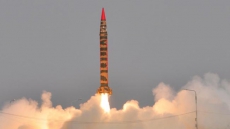Abhijit Banerjee has been awarded the Economics Nobel Prize along with his wife Esther Duflo and another US academic, for their research on how to alleviate poverty that has helped eduction of the poor in India and also revolutionised the field of development economics, the Royal Swedish Academy of Sciences (RSAS) announced on Monday.
Massachusetts Institute of Technology professor Banerjee, an alumnus of Jawaharlal Nehru University and the University of Calcutta, is the second person of Indian Origin to be awarded the prize after Amartya Sen who received it in 1988.
He is the tenth person of Indian origin or citizenship to win a Nobel.
BREAKING NEWS:
— The Nobel Prize (@NobelPrize) October 14, 2019
The 2019 Sveriges Riksbank Prize in Economic Sciences in Memory of Alfred Nobel has been awarded to Abhijit Banerjee, Esther Duflo and Michael Kremer “for their experimental approach to alleviating global poverty.”#NobelPrize pic.twitter.com/SuJfPoRe2N
Banerjee's work encompasses a broad area in India from using in iron-fortified salt to fight anaemia in Bihar and education in West Bengal to e-governance in dealing with programme leakages and police reform in Rajasthan.
Announcing the prize in Stockholm, RSAS Secretary-General Goran Hansson said Banejee, France-born Duflo and Harvard professor Michael Kremer were being honoured for "their experimental approach to alleviating global poverty."
Banerjee is the Ford Foundation International Professor of Economics at MIT and Duflo - the second women to win the Economics Nobel and the youngest person - is the Poverty Alleviation and Development Economics Professor there.
Banerjee received his BSc from University of Calcutta in 1981, his MA from JNU in 1983 and his PhD from Harvard in 1988. He is now a US citizen.
He follows in the footsteps of Sen, whose work in economics also focused on poverty's causes and its alleviation.
Banerjee was one of the advisers to the Congress in this year's elections in moulding the Nyuntam Aay Yojana (NYAY) programme it proposed to give a minimum guaranteed income to 20 per cent poorest people or 50 million families in India. The electorate did not buy into the financial incentive the party offered.
Professors Esther Duflo and Abhijit Banerjee, co-directors of MIT's @JPAL, receive congratulations on the big news this morning. They share in the #NobelPrize in economic sciences “for their experimental approach to alleviating global poverty.”
— Massachusetts Institute of Technology (MIT) (@MIT) October 14, 2019
Photo: Bryce Vickmark pic.twitter.com/NWeTrjR2Bq
"When Less is More: Experimental Evidence on Information Delivery During India's Demonetisation," is one of the research papers he co-authored.
He and Duflo founded the MIT's Abdul Latif Jameel Poverty Action Lab (J-PAL) in 2003, along with Sendhil Mullainathan, now a professor at Chicago University.
"The kind of work we've done over the years, when we started, was marginal in economics" and the award is "great for the development field" within economics and reflects the significance of the work done by many of his colleagues, the MIT quoted him in a press release.
Rousing ovation for MIT's newest Nobel laureates, Esther Duflo and Abhijit Banerjee 👏 #NobelPrize https://t.co/qGKkBgpWul pic.twitter.com/zuvzZfb4Ey
— Massachusetts Institute of Technology (MIT) (@MIT) October 14, 2019
In field research applying their experimental model, Duflo and Banerjee found, for example, that immunisation rates for children in rural India jumped dramatically when their families are offered modest incentives for immunisation, such as lentils, MIT said.
A small incentive to parents like a couple of pounds of lentils led to a massive increase in child immunisations, from 6 per cent to 39 per cent, it said.
Congratulations to Abhijit Banerjee on being conferred the 2019 Sveriges Riksbank Prize in Economic Sciences in Memory of Alfred Nobel. He has made notable contributions in the field of poverty alleviation.
— Narendra Modi (@narendramodi) October 14, 2019
Jakob Svensson, a member of the awards committee, said at a news conference in Stockholm that their work has helped tackle the "learning crisis" around the world and 60 million children in India and Africa have benefited from it.
The prize of Swedish Kroner 9 million (about $915,000) will be shared by the Banerjee, Duflo and Kremer.
I'm proud of Abhijit Banerjee, a Bengali, who got Nobel Prize in economic sciences this year. Amartya Sen was a Bengali, who also won the same prize in 1998. Both want to improve the economic condition of the poor. Unfortunately, a large number of people in both Bengals are poor.
— taslima nasreen (@taslimanasreen) October 15, 2019
Awards committee chair Peter Fredriksson said that their field experiment work has "completely reshaped development economicsa by introducing field research.
Participating in the Stockholm news conference by phone, Duflo said that the prize recognised "a movement much larger than usa of researchers, NGOs and economists who have developed the field experiments in development economics.
Former PM Dr Manmohan Singh congratulates #AbhijitBanerjee on winning the Nobel for Economics. pic.twitter.com/Xxv6hCsFO5
— Nistula Hebbar (@nistula) October 15, 2019
She said that their work is to "make sure that our fight against poverty is based on scientific evidence".
She said that the poor are often caricatured and even those who try to help them do not understand the deep roots of the problem.
JNU. Harvard. #NYAY#AbhijitBanerjee #NobelPrize
— Sanjay Jha (@JhaSanjay) October 14, 2019
Some people must be getting a bad stomach tonight.
"We do try to understand the roots, the interconnected roots of poverty," she said of their work.
Duflo also said she is "humbled" by her success in winning the Nobel prize for economics and hopes it will "inspire many, many other women", the BBC reported.
"I hope showing that it is possible for a woman to succeed and be recognised for success is going to inspire many, many other women to continue working and many other men to give them the respect they deserve like every single human being," she said.
Banerjee and Duflo, along with others, published a paper this year on E-governance impact on programme leakage in India.
He has also co-authored research papers on topics like the untapped math skills of Indian working children and "teaching at right level" in India.
Another programme of the J-PAL in India was about microfinance based on the work of Bengaluru-based Bharatha Swamukti Samsthe (BSS), the MIT said in an earlier press release.
It assessed how participation in microfinance programmes increased when socially influential people got to know about them first.
The press release quoted Banerjee, saying: "While there was a body of elegant theory on the relation between what the network looks like and the speed of transmission of information, there was little empirical work on the subject."
Participation in the microfinance programmes increases by about 11 per cent when well-connected local residents are the first to gain access to them, according to the study, MIT said.
"It could thus be a guide for an organization that tries to (place) a piece of information in a network," Dufolo was quoted as saying.
In 2011, Banerjee was named one of Foreign Policy magazine's top 100 global thinkers.
Noted historian Ramachandra Guha said that Banerjee's ground-breaking scholarship apart, he is also a superb cook and a connoisseur of Hindustani classical music.
"He represents the best of Indian culture and scholarship, while always being open to what the world has to offer," Guha wrote on Twitter while congratulating the Nobel laureate.
The other people who are of Indian descent or citizenship who have won or shared Nobel Prizes are: Rabindranath Tagore (for literature in 1913); C.V. Raman (physics, 1930), Har Gobind Khorana (1968, medicine); Mother Teresa (peace, 1979), Subramanyan Chandrasekhar, (physics, 1983); Amartya Sen (economic, 1988), V.S. Naipaul (literature, 2001), Venkatraman Ramakrishnan (chemistry, 2009), and Kailash Satyarthi (peace, 2014).


